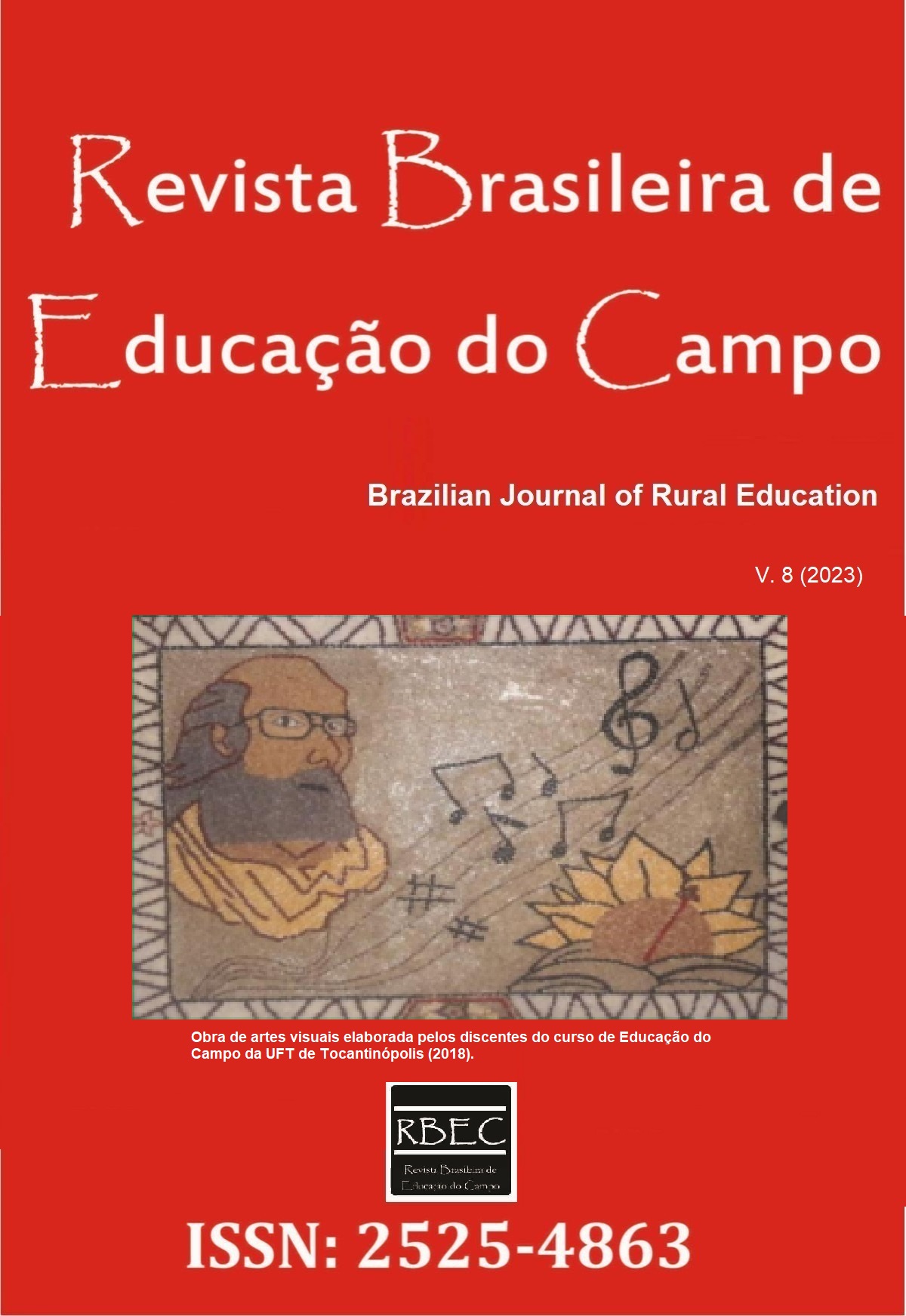Indigenous peoples and school education in the Brazilian Amazon: teaching experiences
DOI:
https://doi.org/10.20873/uft.rbec.e15274Abstract
ABSTRACT. This article presents educational experiences developed with indigenous peoples in the Brazilian Amazon, based on documentary research in dialogue with reports of teaching experiences of the first authors of this text. Thus, we propose to dialogue based on the following question: how is indigenous knowledge mobilized in the Amazonian school context? To this end, we established as a general objective to reflect on the way indigenous knowledge is conceived in the Amazonian school context, based on a dialogue with the reports of teaching experiences with indigenous school education. From this perspective, we understand that Indigenous School Education comprises formal educational actions offered under the supervision of the State to indigenous peoples, unlike indigenous education, which is carried out in the community through social coexistence, depending on the diverse perspectives of each indigenous people. We observed that although there are laws and public policies, conquered by indigenous collectives, that advocate a differentiated, bilingual, intercultural and community school education, as well as provide the conditions for its implementation, in practice this right is still a distant reality of many indigenous schools. To this end, it is necessary to open dialogue and epistemic exchanges that understand diverse knowledges in an equitable way. This premise confronts us with the challenge of the decolonization of knowledge, especially that conveyed in indigenous schools.
Downloads
References
Brasil (1988). Constituição da República Federativa do Brasil. (1988, 05 de outubro). Recuperado de: http://www.senado.gov.br/sf/legislacao/const/. Acesso em 20 de agosto de 2022.
Brasil (1998). Ministério da Educação. Referencial Curricular Nacional para as Escolas Indígenas. Brasília: MEC.
Calderoni, V. A. M. de O., & Nascimento, A. C. (2012). Saberes tradicionais indígenas, saberes ocidentais, suas intersecções na educação escolar indígena. Revista Visão Global, 15(1-2), 303-318. Recuperado de: https://portalperiodicos.unoesc.edu.br/visaoglobal/article/view/3427. Acesso em 20 de agosto de 2022.
D’angelis, W. (2012). Aprisionando sonhos: a educação escolar indígena no Brasil. Campinas, SP: Curt Nimuendajú.
Feitosa, L. B., & Vizolli, I. (2021). Do silenciamento à vez e voz: historicidade e perspectiva educacionais da educação escolar indígena. Revista Cocar, 15(33), 1-19.
Lei n. 9.394, de 20 de dezembro de 1996. (1996, 23 de dezembro). Estabelece as Diretrizes e Bases da Educação Nacional. Recuperado de: http://www.senado.gov.br/sf/legislacao. Acesso em: 22 de setembro de 2022.
Lei n. 11639, de 09 de janeiro de 2003. Estabelece as diretrizes e bases da educação nacional, para incluir no currículo oficial da rede de ensino a obrigatoriedade da temática “história e cultura afro-brasileira”. Recuperado de: Base Legislação da Presidência da República - Lei nº 10.639 de 09 de janeiro de 2003 (presidencia.gov.br). Acesso em: 22 de setembro de 2022.
Lei n.º 11. 645, de 10 de março de 2008. (2008, 10 de março). Inclui no currículo oficial da rede de ensino a obrigatoriedade da temática “História e Cultura Afro-Brasileira e Indígena. Recuperado de: https://www.planalto.gov.br/ccivil_03/Leis/L9394.htm. Acesso em: 22 de setembro de 2022.
Ludke, M., & André, M. (2020). Pesquisa em educação: abordagens qualitativas. 2ª edição. Rio de Janeiro: E.P.U..
Markoni, M. A., & Lakatos, E. M. (2021). Fundamentos de metodologia científica. Edição João Bosco Medeiros. 9. Ed. São Paulo: Atlas.
Melià, B. (1979). Educação Indígena e Alfabetização. Biblioteca Digital Curt Nimuendaju. Edições Loyola.
Minayo, M. C. S. (2016). O desafio da pesquisa social. In: Pesquisa social: teoria, método e criatividade. Petropolis, RJ: Vozes.
Ndlovu, M. (2017). Por que saberes indígenas no século XXI? Uma guindada decolonial. Revista Epistemologias do Sul, 1(1), 127-144. Recuperado de: https://revistas.unila.edu.br/epistemologiasdosul/article/view/782#:~:text=Isto%20ocorre%2C%20sobretudo%2C%20porque%20o,desafios%20globais%20que%20eles%20
Pimentel, S. (2012). O índio que mora na nossa cabeça - sobre as dificuldades para entender os povos indígenas. São Paulo: Prumo.
Rezende, J. S. (2013). Ciências e saberes tradicionais. Revista Tellus, 13(25), 201-213, jul./dez. Recuperado de: https://www.tellus.ucdb.br/tellus/article/view/338
Rua, M. G. (1998). Análise de políticas públicas: conceitos básicos. In Rua, M. G., & Carvalho, M. I. V. (Orgs.). O estudo da política: tópicos selecionados (s./p.). Brasília: Paralelo.
Published
How to Cite
Issue
Section
License
Copyright (c) 2023 Dilma Costa Ferreira, Rossini Pereira Maduro, Thelma Lima da Cunha Ramos, Wellen Crystinne de Araújo Sousa e Silva, Idemar Vizolli, José Vicente de Souza Aguiar, Carolina Brandão Gonçalves, Leila Adriana Baptaglin

This work is licensed under a Creative Commons Attribution 4.0 International License.
Proposal for Copyright Notice Creative Commons
1. Policy Proposal to Open Access Journals
Authors who publish with this journal agree to the following terms:
A. Authors retain copyright and grant the journal right of first publication with the work simultaneously licensed under the Creative Commons Attribution License that allows sharing the work with recognition of its initial publication in this journal.
B. Authors are able to take on additional contracts separately, non-exclusive distribution of the version of the paper published in this journal (ex .: publish in institutional repository or as a book), with an acknowledgment of its initial publication in this journal.
C. Authors are permitted and encouraged to post their work online (eg .: in institutional repositories or on their website) at any point before or during the editorial process, as it can lead to productive exchanges, as well as increase the impact and the citation of published work (See the Effect of Open Access).















